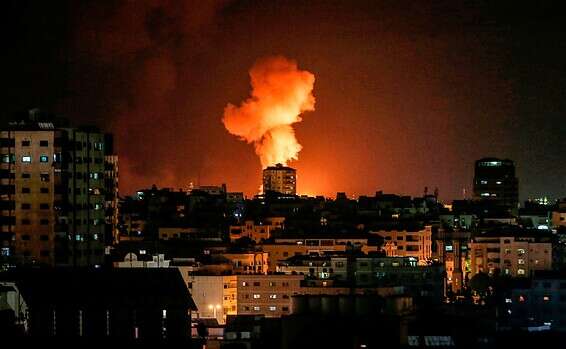Israel cautiously believes that the round of escalation has passed, but is aware that only temporary silence • Islamic Jihad runs an anarchist and independent policy, and is influenced by Iran • The organization is expected to continue its efforts to regulate Hamas - and after the election, it is doubtful whether Israel can continue to interfere • Interpretation
IDF attack in Gaza // Photo: AFP
Last night's (warned) assessment was that the fighting was behind us. Islamic Jihad has sent out candid and secret messages to Israel that have completed its military response, and Israel has made it clear from the outset that it is also now adhering to its policy of quietly responding quietly.
Those behind the efforts to stop the fighting in the south were mainly Egyptian and UN mediators, as well as the Qatari envoy to the Gaza Strip. Hamas also made clear that it had no interest in continuing the escalation, but in the past two days it had a complex policy: on the one hand, it refrained from joining the fighting. A direct front against Israel, but at the same time it also avoids interfering with Islamic Jihad.
This created a dilemma in Israel what to do with Hamas. Israel also had no interest in bringing the large, powerful organization into the fighting circle, but its failure to act against it deviated from its regular policy of hurting the ruling party in the sector to impose its control over the smaller organizations and lead to calm. Ultimately, pragmatism prevailed; Since no one on the Israeli side has any interest in escalation - certainly not on the eve of the elections - it was decided to concentrate the response only against Islamic Jihad.
But even in its anti-organization activity, which is directly responsible for the escalation, Israel has made sure to act in a calculated manner. Last night's attack in Damascus was not intended to eliminate activists (unlike the previous November attack in which Israel, according to foreign publications, tried to eliminate Akram Ajuri, the organization's deputy leader), but against physical infrastructure, and also in the many strikes carried out in Gaza, Israel tried to avoid as many casualties as possible. So as not to widen the escalation cycle.
In any case, the jihad carried out most of the shootings out of pits with timers, so the activists responsible for the shooting could not be harmed. As in similar fighting rounds in the past, its senior officials went underground for fear of their lives (as did many of Hamas's senior officials), so Israel focused its attacks on IAF production sites and other facilities of the organization.
Jihad was also kept from expanding the fighting. The launches were aimed at the Gaza envelope and nearby cities, and the organization avoided launching rockets into more distant cities - Beersheba, Ashdod and certainly Gush Dan - although it has a proven ability to do so. Failure to do so taught that even in Jihad, they sought to manage the crisis and keep it under fire, without risking loss of control and severe Israeli response.
As always, even in this round of fighting, the air defense system provided strong protection to the residents of the envelope. 90 percent of interceptions are slightly lower than those achieved in Operation "Black Belt" following the assassination of Baha Abu al-Alta in November (at that time 94 percent were intercepted), and still - this is a very impressive statistic, which gives Israel significant breathing space and allows it to operate from the head and not under pressure from casualties. Many in the rear.
As mentioned, yesterday, in Israel, they realized that Jihad wanted to close the current round of fighting, which began as mentioned after the destruction of the squad that the organization sent to place a charge on the fence in the southern Gaza Strip. This event developed into a violent struggle, during which the IDF "kidnapped" the body of one of the terrorists, an event that was perceived as a humiliation in Gaza and led to a reaction. The organization's desire to stop fighting also contributed to the closure of all Israeli border crossings and the complete closure of the fishing area.
But even if calm is achieved, it is likely to be temporary and fragile. Hamas wants a broader regulation, but jihad - which runs an independent, anarchist policy with Iranian encouragement - will continue to sabotage efforts. It is doubtful that Israel will be able to keep up with this over time and let the organization manage life in the Gaza Strip.
After the elections, Israel will have to formulate a clearer policy for itself. Make it clear to Hamas (and through other organizations in the Gaza Strip) that the games are over. If the series - and calm - were not achieved, it would be ready to go all the way to achieve them by force.

